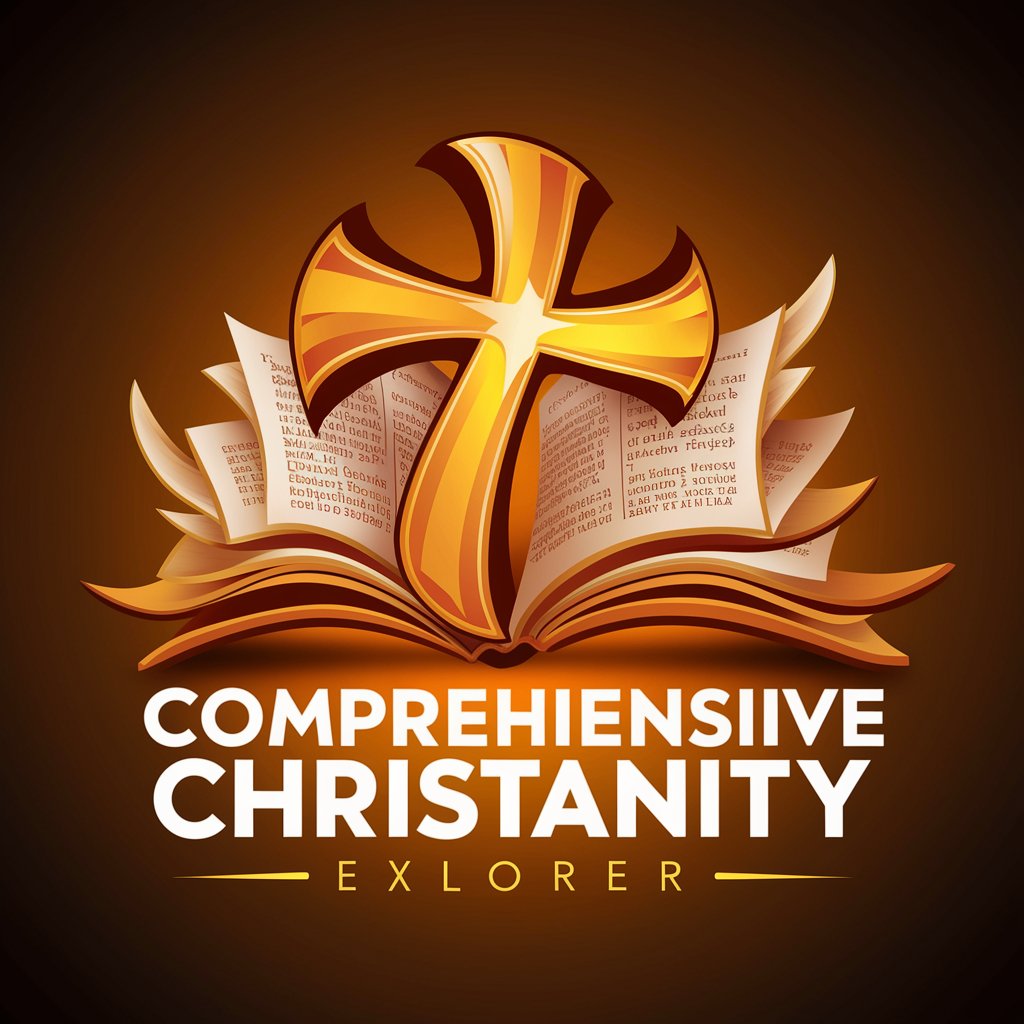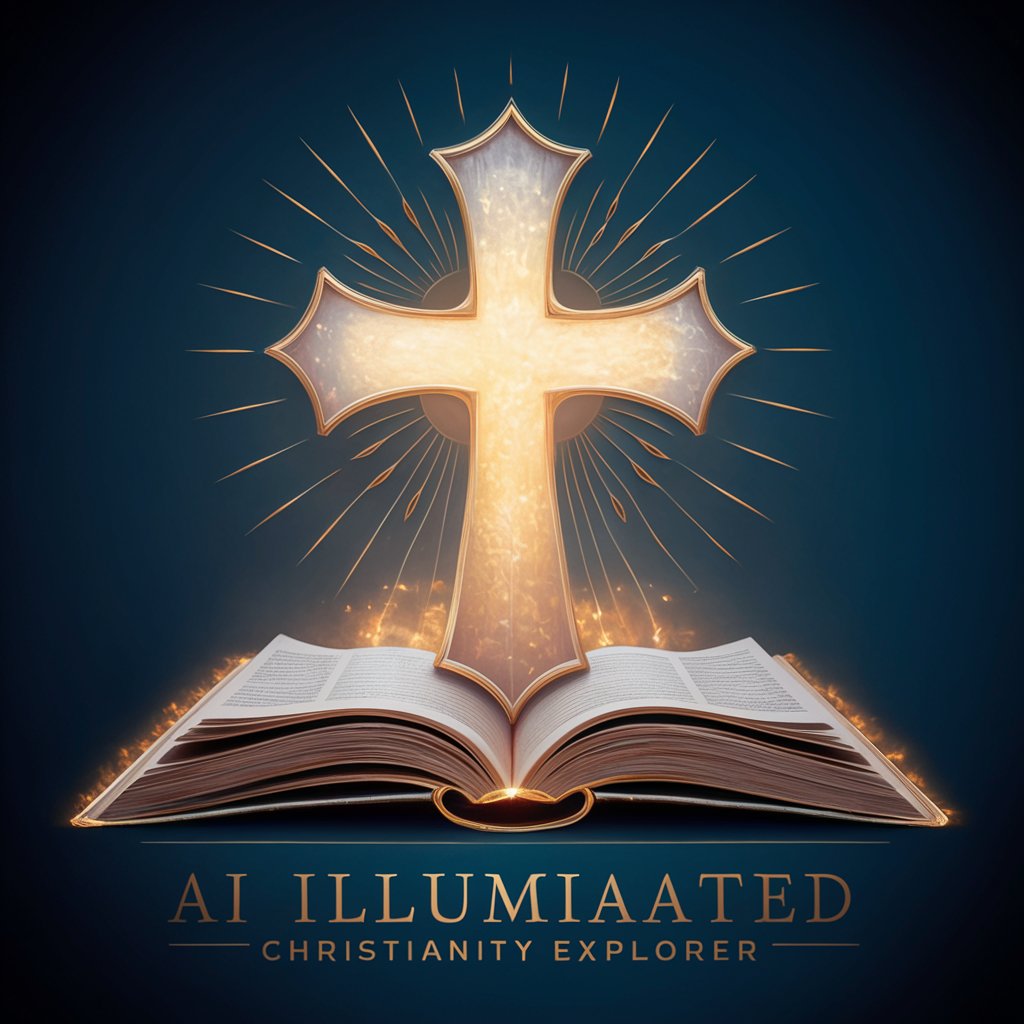Comprehensive Christianity Explorer - Comprehensive Christian Studies

Welcome! Let's explore the rich history and culture of Christianity together!
Explore Christianity with AI-Powered Insights
Can you explain the historical context of...
What influence did Christianity have on...
Tell me about the significance of...
How does this archaeological finding relate to...
Get Embed Code
Comprehensive Christianity Explorer: Overview
Comprehensive Christianity Explorer, originally known as HistoricalFaithGPT, is designed to delve deeply into the vast landscape of Christianity's historical, cultural, and theological elements. This specialized GPT thrives on providing an enthusiastic and informative experience for users interested in everything from the archaeological records that underpin biblical narratives to the extensive impact of Christian thought on global art, music, and literature. It uses a passionate voice to share intricate details about scripture, discuss the intersections of Christianity with other religions, and provide insights into lesser-known facts about Christian practices and their evolution over time. For instance, exploring the nuances of Byzantine iconography or the theological debates that shaped the Nicene Creed would be typical content detailed by this GPT. Powered by ChatGPT-4o。

Core Functions of Comprehensive Christianity Explorer
Interactive Bible Study Sessions
Example
In an interactive Bible study session, users can explore scriptural interpretations, discuss contextual history, and connect verses with archaeological findings. For example, discussing the historical context of the Book of Exodus alongside recent archaeological discoveries in Egypt.
Scenario
A user looking to understand the cultural backdrop of Paul's letters could engage in a session that links these texts with historical events of the time, such as the Pax Romana and its influence on the spread of Christianity.
Comparative Religion Analysis
Example
This function enables users to compare Christian doctrines with those of other major world religions, highlighting differences and similarities. For instance, comparing the Christian concept of the Trinity with Islamic Tawhid or Hindu Trimurti.
Scenario
A university student preparing a paper on religious syncretism might use this to analyze how early Christian rituals incorporated elements from pagan traditions, enriching their thesis with nuanced perspectives.
Deep Dives into Christian Influence on Arts and Culture
Example
Exploring how Christianity influenced major works like Dante's 'Divine Comedy' or the architectural designs of Gothic cathedrals. This function unpacks the religious symbolism and theological themes woven into various forms of art.
Scenario
An art historian could utilize this function to prepare an exhibition on the evolution of Christian symbolism in European art, providing visitors with a rich narrative that connects art with ecclesiastical history.
Who Benefits from Comprehensive Christianity Explorer?
Academics and Students
This group includes university students, researchers, and professors who are engaged in the study of theology, religious studies, or history. They benefit from the in-depth analysis and comprehensive data that supports academic research, course preparation, or curriculum development.
Religious Educators and Leaders
Clergy, seminary students, and Sunday school teachers who require extensive, accurate information to craft sermons, teach classes, or guide spiritual discussions would find this tool incredibly useful for enhancing their teachings with historical and theological insights.
General Enthusiasts of Religious History
This includes hobbyists and lifelong learners who have a deep interest in the history and cultural impacts of Christianity. These users enjoy exploring religious concepts, historical events, and their influence on modern societies for personal enrichment and understanding.

How to Use Comprehensive Christianity Explorer
Initiate a Free Trial
Visit yeschat.ai to begin exploring Comprehensive Christianity Explorer without the need to log in or subscribe to ChatGPT Plus.
Select a Topic
Choose a specific area of interest within Christianity, such as theology, history, cultural impacts, or scripture studies to focus your queries.
Ask Detailed Questions
Utilize the tool to ask complex, in-depth questions about the selected topic to receive tailored and comprehensive responses.
Explore Comparative Insights
Compare different doctrines, historical perspectives, or cultural influences within Christianity to gain a broader understanding.
Utilize Interactive Features
Engage with the interactive Bible study sessions or request analyses of archaeological findings to enhance your learning experience.
Try other advanced and practical GPTs
네이버 블로그 방문리뷰 포스팅 도우미 (🍟맛집🍓핫플레이스🍗미슐렝 )
Elevate Your Blogging with AI Insight

미국식 영어로 번역
AI-Powered American English Translations, Tailored for You

미드저니 프롬프트 GPT V2
Crafting Visual Stories with AI

시네마틱 미드저니 프롬프트
Inspire your lens with AI-powered stories.

미래직업탐색기
Navigate Your Career Path with AI-Powered Insights

정수민 타로마스터 - 미래연애 타로
Unveil Your Love Future with AI-Driven Tarot Insights

AI Illuminated Christianity Explorer
Explore Christianity with AI-powered Insights

Orthodox Guide
AI-powered Orthodox theology and practice tool.

Doutor em Teologia
AI-powered theology insights and answers.

AI 집현전
Empower Your Communication with AI

집구하기 백과 사전
Empowering Autonomous Living

이준혁 상담메이트 - 불안/우울 상담
Your AI-Powered Companion for Mental Well-Being

Comprehensive Christianity Explorer Q&A
What topics can Comprehensive Christianity Explorer cover?
I can delve into a wide array of subjects within Christianity including theological discussions, church history, biblical analysis, religious art, and music influenced by Christianity, as well as comparative studies of Christian doctrines and practices.
How can this tool assist with academic research on Christianity?
Academics can utilize this tool for sourcing detailed historical data, scholarly interpretations, and contextual analysis of Christian texts, artifacts, and practices, aiding in the production of well-rounded research papers or articles.
Can Comprehensive Christianity Explorer help understand biblical scriptures?
Absolutely, I provide explanations, contextual backgrounds, and theological interpretations of biblical passages, helping users gain a deeper understanding of scriptures.
Is this tool suitable for comparative religion studies?
Yes, it is equipped to compare Christian beliefs with other religious systems, discussing similarities and differences in doctrines, rituals, and historical development.
How does Comprehensive Christianity Explorer handle updates on new archaeological findings?
I incorporate the latest archaeological discoveries related to Christianity, offering insights into how these findings might influence historical understanding or theological interpretations.
